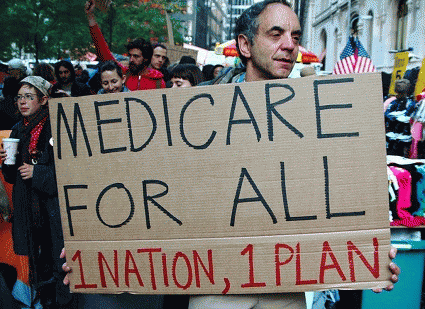From Truthdig
The Center for American Progress (CAP), a Washington-based Democratic Party think tank funded by Wall Street, including private health insurers and their lobbying group, unveiled a new healthcare proposal designed to confuse supporters of "Medicare for All" and protect private health insurance profits. It is receiving widespread coverage in "progressive" media outlets. We must be aware of what is happening so that we are not fooled into another "public option" dead end.*
The fact that CAP is using Medicare for All language is both a blessing and a curse. It means Medicare for All is so popular that they feel a need to co-opt it, and it means that they are trying to co-opt it, which will give Democrats an opportunity to use it to confuse people.
This effort could be preparation for the possibility that Democrats win a majority in Congress in 2018 or 2020. It is normal for the pendulum to swing to the party opposite the President's party during the first term in office. If Democrats win a majority, they will be expected to deliver on health care, but they face a dilemma of having to please their campaign donors, which includes the health insurance industry, or pleasing their voters, where 75% support single-payer health care.
The public is aware that the Affordable Care Act (ACA) protects the profits of the medical-industrial complex (private health insurers, Big Pharma and for-profit providers) and not the healthcare needs of the public. "Fixing the ACA" is not popular. Last year during repeal attempts, people made it clear at town halls and rallies that they want a single-payer healthcare system such as National Improved Medicare for All (NIMA). By offering a solution that sounds good to the uninformed, "Medicare Extra for All," but continues to benefit their Wall Street donors, Democrats hope to fool people or buy enough support to undermine efforts for NIMA.
This is an expected development. If we look at the phases of stage six of successful social movements by Bill Moyers (see slide 8), we see that as a movement nears victory, the power holders appear to get in line with the public's solution while actually attacking it. If the movement recognizes what is happening, that this is a false solution and not what the movement is demanding, then we have a chance to win NIMA. If the movement falls for the false solution, it loses.
Our tasks at this moment are to understand what the power holders are offering, recognize why it is a false solution and reject it.
"Medicare Extra for All" versus National Improved Medicare for All
The basic outline for the new proposal is that people would be able to buy a Medicare plan, a form of "public option," including the Medicare Advantage plans offered by private health insurers. People who choose to buy a Medicare plan would pay premiums and co-pays, as they do now for private health insurance. The new Medicare system would replace Medicaid for people with low incomes.
Private health insurance would still exist for employers, who currently cover the largest number of people, federal employees and the military. While workers would have the option to buy a Medicare plan, it is unclear how many would do so given that most employers who provide health insurance have their own plans and that private health insurers are experts at marketing their plans to the public.
NIMA, as embodied in HR 676: "The Expanded and Improved Medicare for All Act," would create a single national healthcare system, paid for up front through taxes, that covers every person from birth to death and covers all medically-necessary care. NIMA relegates private insurance to the sidelines where it could potentially provide supplemental coverage for those who want extras, but it would no longer serve as a barrier for people who need care.
Here are the flaws in the CAP proposal:
- CAP's plan will continue to leave people without health insurance. Instead of being a universal system of national coverage like NIMA, coverage under the CAP plan relies on people's ability to afford health insurance. Only people with low incomes would not pay, as they do now under Medicaid. Just as it is today, those who do not qualify as low income, but still can't afford health insurance premiums, would be left out. Almost 30 million are without coverage today. There is no guarantee that health insurance premiums will be affordable.
- CAP's plan will continue to leave people with inadequate coverage. Under NIMA, all people have the same comprehensive coverage without financial barriers to care. The CAP plan allows private health insurers to do what they do best -- restrict where people can seek health care, shift the cost of care onto patients and deny payment for care. This is the business model of private health insurers because they are financial instruments designed to make profits for their investors. People with health insurance will face the same bureaucratic nightmare of our current system and out-of-pocket costs that force them to delay or avoid health care or risk bankruptcy when they have high health care needs.
- CAP's plan will continue the high costs of health care. NIMA has been proven over and over to have the best cost efficiency because it is one plan with one set of rules. It is estimated that NIMA will save $500 billion each year on administrative costs and over $100 billion each year on reduced prices for pharmaceuticals. As a single purchaser of care, NIMA has powerful leverage to lower the costs of goods and services. The CAP plan maintains the complicated multi-payer system that we have today. At best, it will only achieve 16% of the administrative savings of a single-payer system and it will have less power to reign in the high costs of care.
(Note: You can view every article as one long page if you sign up as an Advocate Member, or higher).






